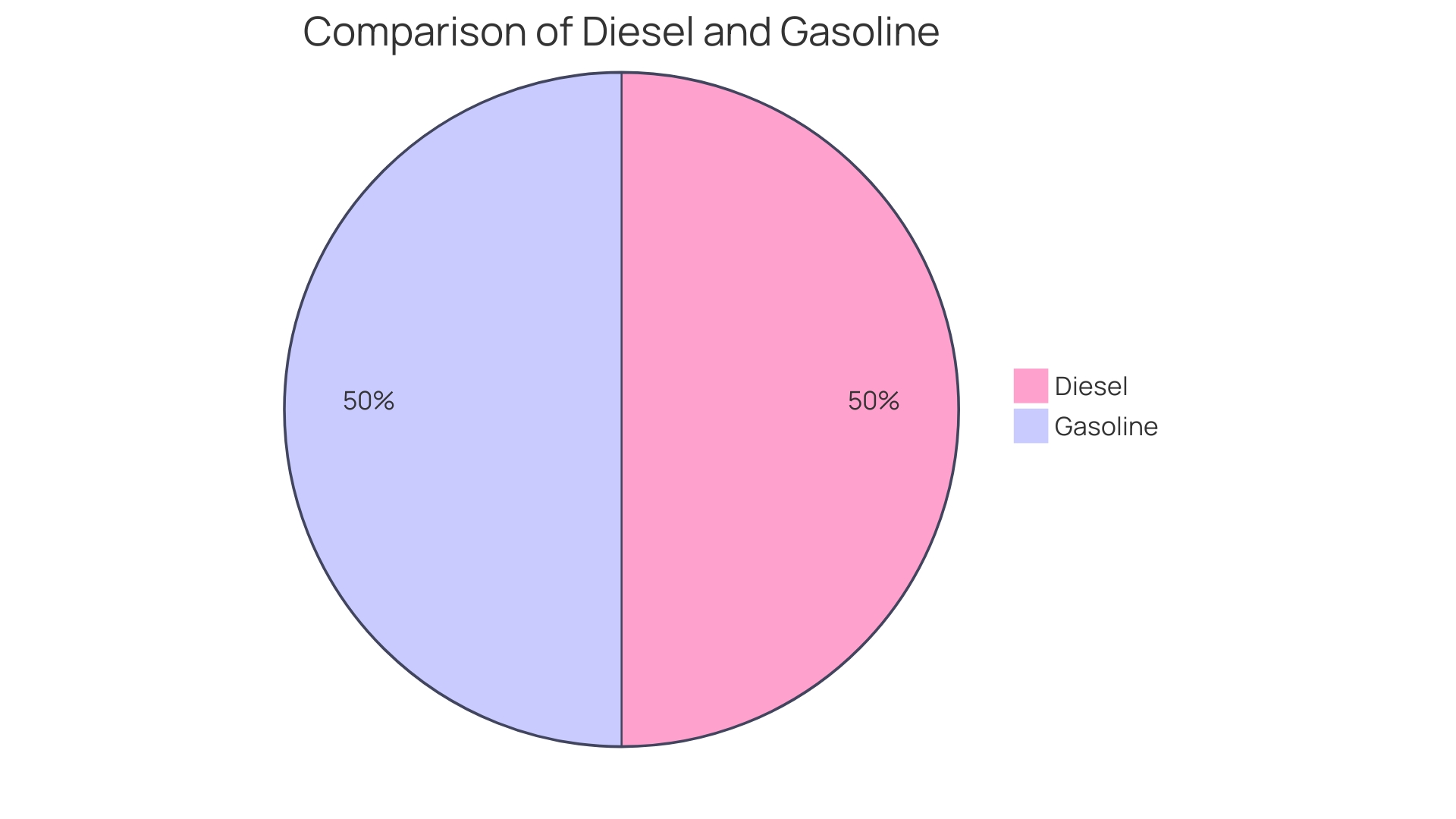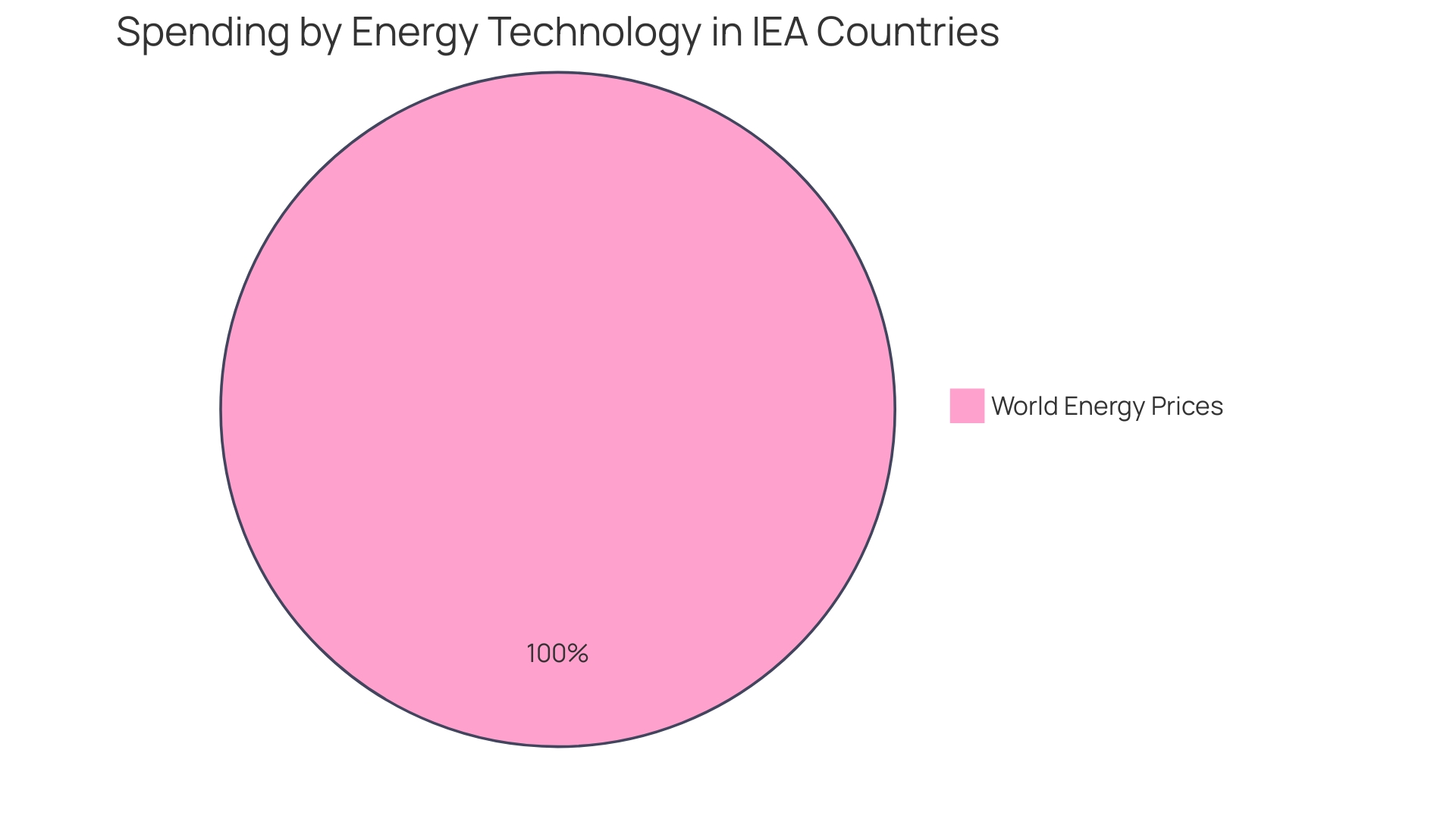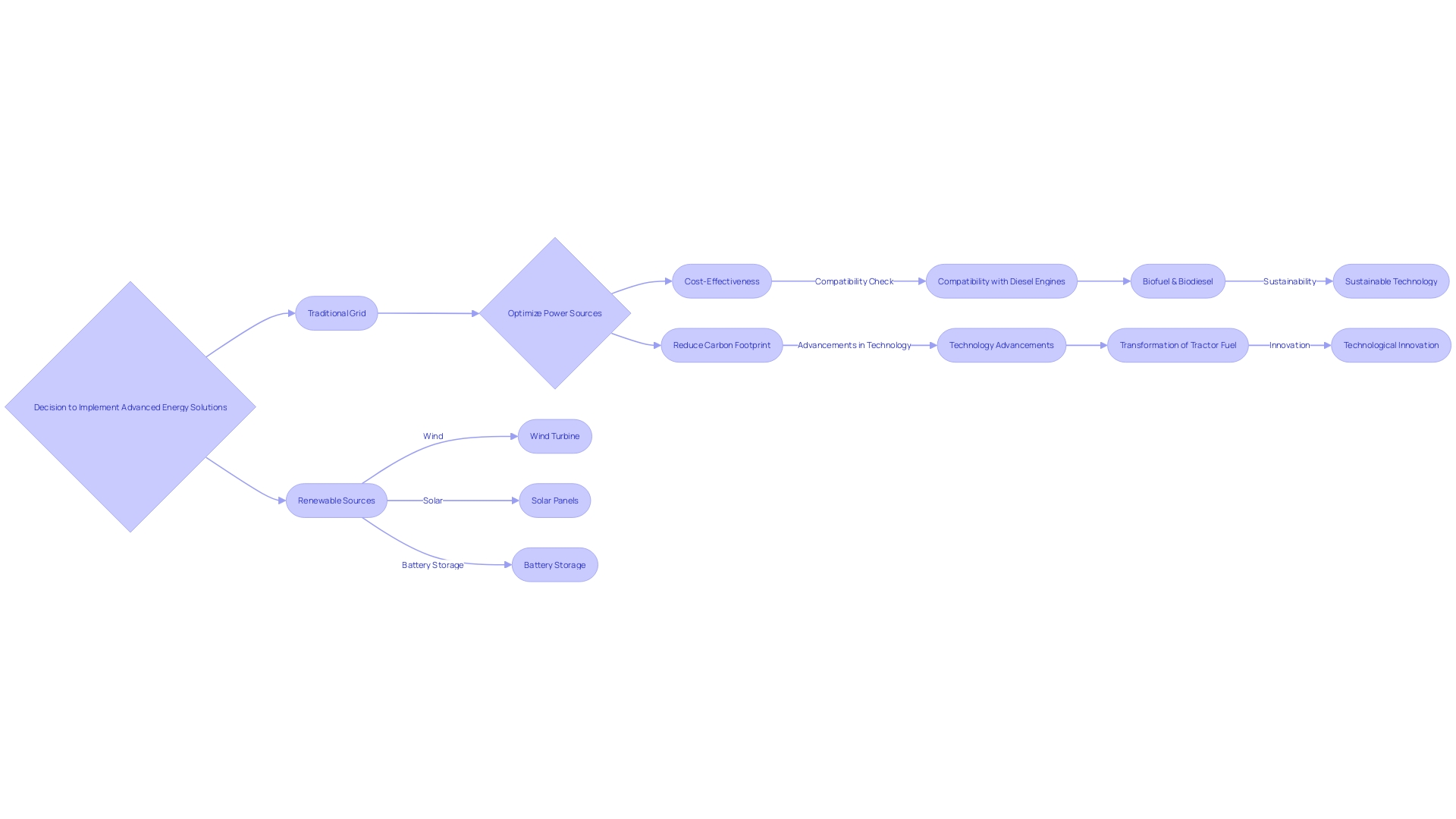Introduction
Tractors, the workhorses of agriculture, have undergone significant advancements since their inception. One pivotal development was the diesel engine, invented by Rudolf Diesel in the late 19th century. Originally designed to run on vegetable oils, the engine was later adapted to use petroleum-based diesel, revolutionizing the agricultural machinery sector.
This adaptation paved the way for more powerful and efficient tractors, which are now integral to modern farming practices. The relationship between energy and agriculture has always been crucial, with energy playing a vital role in powering machinery, providing climate control, and enhancing productivity. However, technological advancements have led to improved energy-use efficiency over time, reducing overall expenses.
As the agricultural landscape continues to evolve, innovative solutions like AGCO Power's Microgrid Concept are being introduced. This forward-thinking approach allows farmers to build their own smart electrical grids, utilizing the most cost-effective power source available, including renewable energy. Embracing such advancements not only contributes to cleaner farming practices but also highlights the ongoing transformation of agriculture through the integration of modern energy solutions.
History of Tractor Fuel Diesel
Tractors, the workhorses of agriculture, have come a long way since their inception. The combustion motor, the brainchild of Rudolf Diesel, was a pivotal development in the late 19th century. Originally designed to run on vegetable oils, the motor was subsequently modified to use petroleum-based diesel, representing a notable achievement in the field of farming equipment. This adaptation paved the way for more powerful and efficient tractors, which have become central to modern farming practices. The evolution of tractor engines is reflective of the broader relationship between energy and agriculture, where energy has historically played a crucial role as an input for farming operations. From powering machinery to drying grain and providing climate control, the interaction between these sectors has been crucial in shaping productivity in farming. Interestingly, while energy remains a key component of production expenses in agriculture, technological advancements have led to improved energy-use efficiency, reducing its overall expense share over time.
Alongside these advancements in fuel technology, the farming scenery keeps progressing with the implementation of inventive solutions such as AGCO Power's Microgrid Concept. This forward-thinking approach allows farmers to build their own smart electrical grids, which enable the use of the least expensive power source at any given time, whether it's from the grid, renewable energy plants, or battery packs. Embracing such advancements not only contributes to cleaner farming practices but also underscores the ongoing transformation of agriculture through the integration of modern energy solutions. As the sector continues to advance, it does so on the foundation of historical innovations like the combustion engine, which have paved the way for a more efficient and sustainable agricultural future.

Composition and Properties of Tractor Fuel Diesel
Diesel fuel, a complex blend of hydrocarbons, is refined from crude oil using distillation. Its composition aligns with various regional standards, influencing factors such as viscosity and cetane number, which are crucial for diesel efficiency and performance. Recent studies investigate the role of biodiesel, unveiling its potential to enhance particular functionalities of the engine. However, biodiesel's influence on nitrogen oxide (NOx) emissions, a substantial air pollutant, remains contentious. Research indicates a possible increase in NOx emissions with biodiesel, though some findings suggest a decrease, reflecting the intricate dynamics between biodiesel composition, vehicle types, and operational conditions.
As technological advancements continue, the environmental benefits of alternative energy sources such as biogas become more apparent, particularly in reducing greenhouse gas emissions. Biogas utilization in vehicles can lead to significant environmental and socio-economic improvements, supporting sustainable development goals by providing cleaner energy solutions and fostering economic opportunities.
In the context of motor performance, diesel's high torque output makes it the preferred option for heavy-duty applications. Torque, the rotational force necessary for moving heavy loads, and horsepower, the speed at which work is done, are pivotal in the capability of the machinery. Diesel engines, leveraging their robust torque, excel in power-intensive tasks, surpassing gasoline engines in thermal efficiency, economy, and longevity.
Rudolf Diesel's pioneering work on alternative energy sources, including vegetable oils, set the foundation for modern biodiesel and renewable diesel. These bio-based diesels, primarily derived from vegetable oils, are seamlessly integrated into petroleum distillate, backed by supportive regulations. Despite certain drawbacks such as reduced energy density and performance in cold weather, biodiesel and renewable diesel effectively function in modern diesel engines, indicating a future with a range of sustainable alternatives.

Benefits of Tractor Fuel Diesel
Diesel fuel's high energy density delivers superior fuel efficiency for tractors, translating into extended operation between refills. Its robust composition ensures that tractors benefit from enhanced torque and power capabilities, essential for heavy-duty agricultural tasks. Diesel's reliability under strenuous conditions is a testament to the engine's design, which is crafted to withstand the rigors of farm work over long periods. Furthermore, the extensive availability of fuel ensures that farmers have consistent access to this essential resource, regardless of geographical location. Safety is also a paramount concern in farming operations, and diesel's higher flash point compared to gasoline reduces the risk of ignition, making it a safer choice for on-farm storage and handling. As farming technology progresses, the incorporation of new energy solutions like AGCO Power's Microgrid Concept is poised to transform the industry, providing smarter and cleaner energy management systems that align with climate protection goals and enhance the sustainability of farming practices.
Impact on Tractor Performance and Efficiency
The agricultural industry is on the cusp of a green revolution, with companies like AGCO Corporation and Blue World Technologies paving the way for sustainable energy alternatives. Methanol, a liquid alternative, is emerging as a promising candidate for green propulsion in farming equipment, offering a flexible and eco-friendly solution. As Mads Friis Jensen, the Chief Commercial Officer of Blue World Technologies, highlights, methanol's similarity to diesel in terms of storage requirements—without the need for complex arrangements like those for hydrogen—makes it a viable option for farmers seeking to align with climate protection goals.
Kari Aaltonen, AGCO Power's Director of Engineering, highlights the significance of high electrical efficiency in cells, particularly when combined with green methanol, in enhancing the performance of farming equipment. Likewise, Atlas Ai's collaboration with Hello Tractor exemplifies innovation in the agricultural sector. They have developed a forecasting dashboard using satellite imagery and earth observation datasets, which provides timely equipment recommendations to farmers. This technological advancement is crucial in an era where climate change is altering traditional farming practices.
When considering the advancement of fuel quality for tractors, it is crucial to take into account the progression of diesel and its alternatives. Bio-based diesels, mainly consisting of vegetable oil and backed by the identical regulations as conventional fuel, are currently being mixed into the petroleum supply. This shift towards biodiesel and renewable options, which constitute more than 80% of bio-based diesel production, is indicative of the changing landscape of energy sources in agriculture.
Statistical models project an increase in the consumption of diesel-equivalent substances as economies grow, emphasizing the necessity for continuous innovation in energy sources. With modern engines designed for less viscous substances, biodiesel and renewable fuel, derived from organic oils and fats, are proving to be efficient alternatives. Farmers, understanding the significance of research and development, are embracing these new technologies to enhance tractor performance and energy efficiency, as expressed by Matt Miles, a fourth-generation farmer.
Ensuring optimal performance and minimizing emissions require selecting high-quality diesel with the right cetane rating, sulfur content, and lubricity. With the progress of the sector, the incorporation of eco-friendly resources and anticipatory technologies is poised to transform farming methods, enhancing equipment productivity and promoting ecological responsibility.

Technological Advancements in Tractor Fuel Diesel
As we delve into the realm of tractor fuel technology, it's clear that the agricultural industry is at the cusp of an energy revolution. The development of engines powered by compression ignition is not just about optimizing performance but also pivoting towards sustainability. Ultra-low sulfur fuel (ULSF) is a prime example of this shift, dramatically lowering sulfur content to mitigate emissions, thereby contributing to cleaner air and a healthier environment. Moreover, the incorporation of exactness additives for combustion enhancement and sophisticated injection systems has been crucial. This fine-tuning not only enhances the effectiveness of modern diesel engines but also reduces the use of energy, which is a blessing for cost-conscious farming operations.
In conjunction with these advancements, the farming sector is utilizing the adaptability of electricity through innovative concepts like the Microgrid Concept by AGCO Power. This forward-thinking approach empowers farmers to create their own intelligent electrical grids, optimizing energy use by selecting the most economical power source at any given moment—be it a conventional power grid, wind or solar installations, or even a generator. Such smart grids not only offer uninterrupted power supply but also the ability to store renewable energy for future use, like charging electric vehicles, which further underscores the sector's commitment to cleaner farming practices.
The transformative power of electricity in agriculture is underscored by statistics revealing the significant pollution caused by traditional lawn and garden equipment. With some machines emitting pollution equivalent to driving a car for hundreds of miles in just one hour, the urgency for electric solutions becomes undeniable. This shift is not solely environmentally driven; it reflects a practical response to the unique demands of today's farmers, as articulated by industry leaders who recognize the necessity of tailored R&D efforts.
In essence, the future of tractor energy technology is intricately linked with the broader adoption of electric solutions in agriculture. By embracing both enhanced fuel technologies like ULSD and the electrification of farming operations, we can anticipate a landscape where efficiency and sustainability are inextricably intertwined, ensuring a cleaner, more productive future for the farming community.
Environmental Considerations
Tractor fuel has been a backbone for agricultural productivity, but its environmental influence cannot be overlooked. Diesel motors, the powerhouses behind these tractors, have historically been significant contributors to air pollution through emissions of nitrogen oxides (NOx) and particulate matter (PM). These pollutants have profound implications for air quality and public health, exacerbating issues like respiratory disorders and environmental degradation.
Nevertheless, the narrative is changing with the advent of innovative emissions control technologies. Diesel oxidation catalysts (DOC) and selective catalytic reduction (SCR) systems are at the forefront of this transformation. DOCs serve to chemically convert carbon monoxide into less harmful carbon dioxide. In parallel, SCRs use a urea-based solution to break down NOx into nitrogen and water, which are harmless to the environment.
The incorporation of these technologies into combustion engines aligns with the broader movement towards reducing the carbon footprint of energy consumption. Recognizing the historical background - that Arrhenius anticipated in 1896 a notable increase in global temperatures because of CO2 emissions - ongoing efforts to enhance technology for combustion engines are not just advancements but necessities.
This is highlighted by the growing pressure on engineers and technologists to tackle the climate crisis, as the combustion of fossil fuels has been identified as a main cause of global warming. Moreover, the recent deployment of the world's first methanol-powered container ship and the phasing out of traditional combustion vehicles in favor of electric alternatives reflect a broader commitment to curbing greenhouse gas emissions.
Such advancements in engine technology and fuel alternatives represent a concerted effort to mitigate the environmental impact of diesel engines. As the global population continues to grow, these technological strides offer a glimpse of hope for a more sustainable future in which farming productivity and environmental stewardship can coexist harmoniously.
Future Trends in Tractor Fuel Diesel
With the agricultural sector evolving rapidly, the integration of advanced energy solutions is becoming pivotal. The Microgrid Concept, introduced by AGCO Power, reflects a significant shift towards energy autonomy and efficiency on the farm. By enabling farmers to create their own intelligent electrical grids, the concept allows for an optimized mix of power sources - from traditional grids to renewable options like wind, solar, and battery storage - ensuring cost-effectiveness and reducing carbon footprint.
Renewable fuel and biodiesel, products derived from organic oils and fats, are emerging as viable substitutes for traditional petroleum-based fuel, aligning with the industry's move towards sustainability. These energy sources are compatible with contemporary diesel engines that have significantly advanced from their predecessors from a century ago. Today, they deliver greater power output per liter, while adhering to stringent emissions standards.
Moreover, advancements in technology related to energy and vehicle technologies are being documented by the National Renewable Energy Laboratory of the Department of Energy. This data provides valuable insights for future transportation analysis, including the potential of different energy sources.
"Our research and development must cater to diverse agricultural demands," suggests a quote underscoring the need for customizable energy solutions. The future of tractor fuel diesel is indeed poised for a transformation, driven by the dual engines of technological innovation and sustainability.

Conclusion
In conclusion, the evolution of tractor fuel, particularly diesel, has revolutionized modern agriculture. The diesel engine, invented by Rudolf Diesel, paved the way for powerful and efficient tractors that are integral to farming practices today. Energy has always been crucial in agriculture, powering machinery and enhancing productivity.
Technological advancements have improved energy-use efficiency, reducing overall expenses over time.
AGCO Power's Microgrid Concept allows farmers to build their own smart electrical grids, utilizing cost-effective power sources, including renewable energy. Embracing such advancements contributes to cleaner farming practices and highlights the ongoing transformation of agriculture through modern energy solutions.
Biodiesel and renewable diesel, derived from vegetable oils, have the potential to enhance engine functionalities. The sector is also exploring alternative fuels like biogas, which can significantly reduce greenhouse gas emissions.
Diesel fuel offers benefits for tractors, including high energy density for superior fuel efficiency, enhanced torque and power capabilities, and widespread availability. The integration of new energy solutions like AGCO Power's Microgrid Concept revolutionizes the industry, offering smarter and cleaner energy management systems.
Technological advancements in tractor fuel diesel, such as ultra-low sulfur diesel (ULSD) and precision fuel additives, have improved efficiency and reduced fuel consumption. The electrification of agricultural operations holds great potential for optimizing energy use and supporting cleaner farming practices.
Emissions control technologies help reduce air pollution and mitigate the environmental impact of diesel engines. These advancements align with the movement to reduce the carbon footprint and address the climate crisis.
Looking ahead, the future of tractor fuel diesel lies in the integration of advanced energy solutions and sustainability. The Microgrid Concept allows for energy autonomy and efficiency on the farm, while renewable diesel and biodiesel offer viable substitutes for traditional diesel. Technological innovation and sustainability will continue to drive the transformation of tractor fuel diesel, paving the way for a cleaner and more productive future in the farming community.




